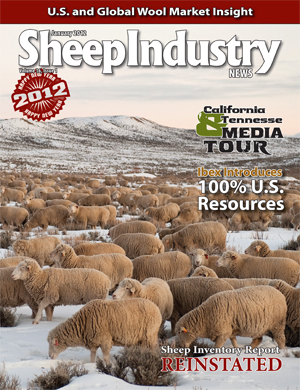GOP Lawmakers Target Endangered Species Act
(January 1, 2012) A deal was reached between the U.S. House of Representatives and the U.S. Senate in December to fund the federal government for the remainder of fiscal year 2012 (through September 2012).
The funding bill sets government spending for the year at $1.043 trillion, a level agreed to in an August deal that raised the nation’s legal borrowing limit. The figure represents a 1.5-percent drop in spending from the fiscal year that ended Sept. 30.
The omnibus spending package outlines spending for nine government agencies, including the Department of Interior, Environment and Related Agencies, which includes American Sheep Industry Association (ASI) supported language regarding sheep grazing and wild sheep. The language prohibits the U.S. Forest Service from using funds to reduce domestic sheep grazing because of conflicts with bighorn sheep, unless the management is consistent with a state wildlife plan. The Bureau of Land Management must consult with state fish and game agencies and follow state wildlife management plans to the extent that they don’t conflict with federal laws.
“The sheep industry is very grateful for the leadership and commitment of Rep. Mike Simpson (Idaho) to include the sheep industry language in the interior bill,” comments Margaret Soulen Hinson, ASI president. “This inclusion gives the industry and researchers the necessary time to finalize the implementation of promising vaccines to address disease issues, as well as strategies to implement best management practices to promote the coexistence of both species of sheep.”
Soulen Hinson added that lawsuits by anti-livestock groups have been driving the decisions of federal land managers threatening nearly 25 percent of sheep production in America.
A statement by House Interior Appropriations Chairman Simpson in December said, “I don’t believe that putting ranchers out of business is an acceptable solution to this problem. I believe that if we are thoughtful and willing to invest time and energy into research and management, we can find a solution to this problem that conserves both bighorn populations and the domestic sheep industry.”
Also supported by ASI is language that addresses trailing permits that have been a subject of lawsuits of late as well.
In a related note, the ASI nationwide solicitation to fund a resolution of the wild sheep controversy has reached over 200 contributors totaling more than $40,000. A listing of donors to publication date is available on page 27 of this issue.
“We have had a great response to this solicitation and encourage those who have not yet contributed to strongly consider supporting this critical industry wide initiative,” concludes Soulen Hinson.


